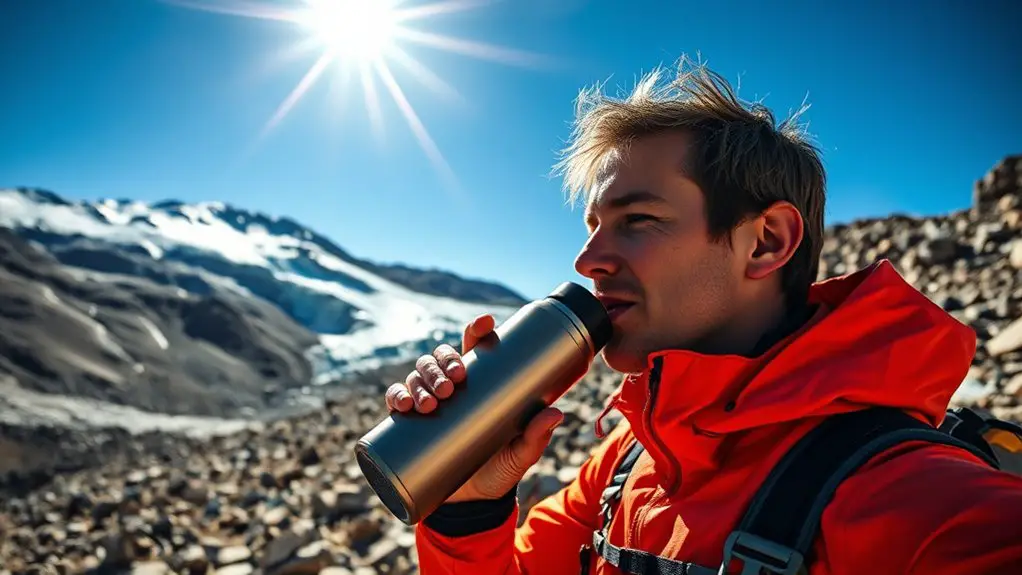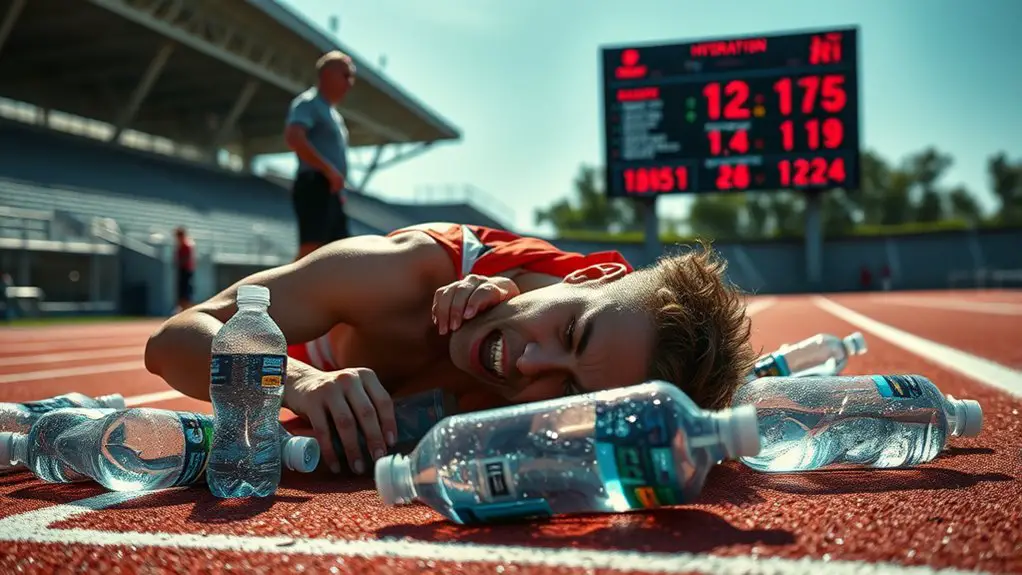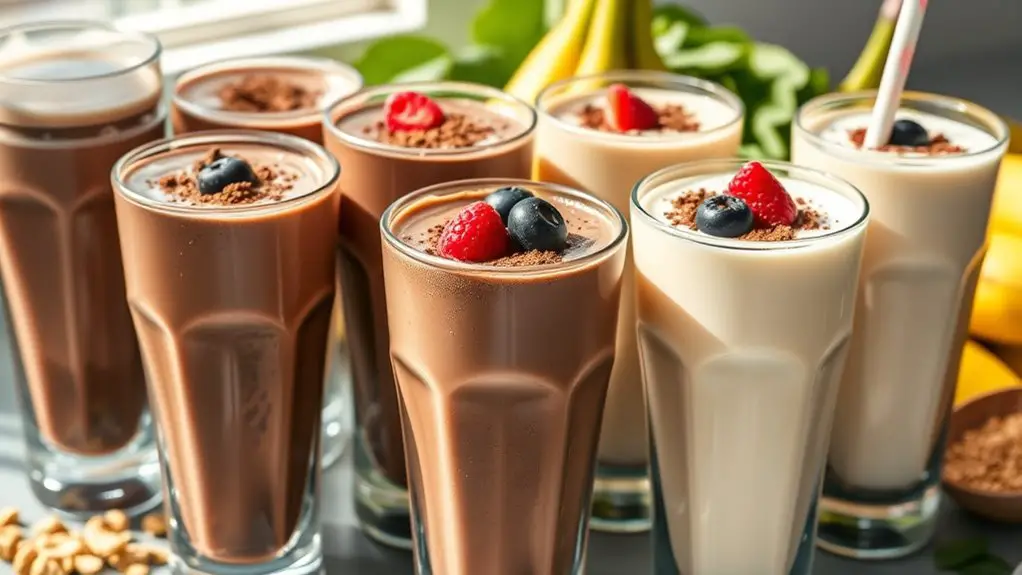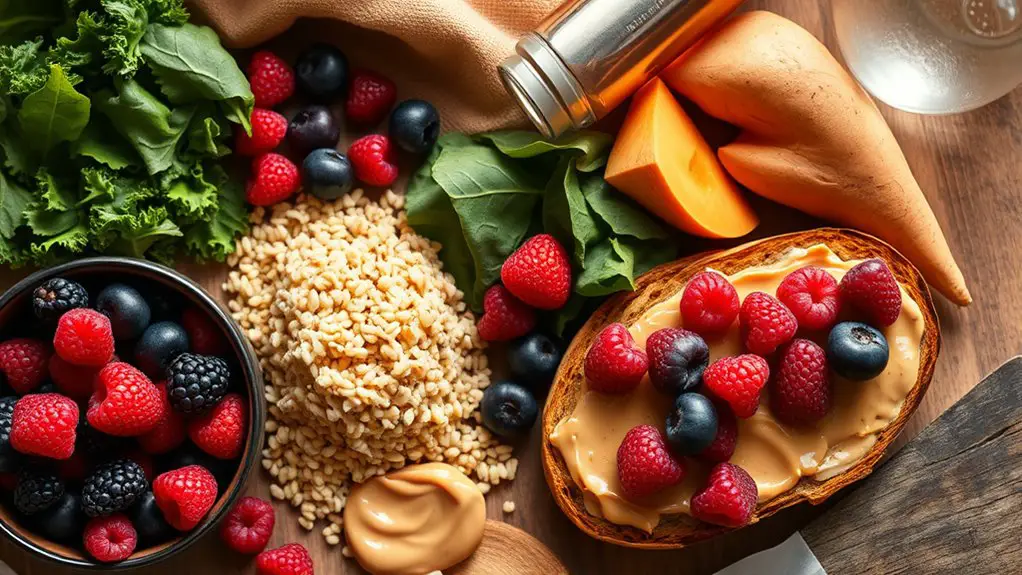In extreme conditions, hydration strategies are vital for maintaining your health and performance. As temperatures soar or plummet, your body's fluid needs shift considerably. Understanding the signs of dehydration, such as fatigue and dark urine, can help you stay ahead of the game. Tailoring your water intake to your environment and activities is essential. Incorporating electrolytes into your routine can also enhance your hydration. Learn more about effective hydration techniques and tools to keep you safe in challenging environments.
Understanding the Basics of Hydration
When you're in extreme conditions, understanding the basics of hydration becomes vital for your survival and performance. Water is your lifeline, fueling your body and keeping your mind sharp. It's not just about drinking when you're thirsty; it's about staying ahead of dehydration. You need to know how much water your body requires, which can vary based on activity level, climate, and your individual needs.
Aim to drink small amounts regularly instead of waiting until you're parched. Keep in mind that electrolytes play an important role, especially in hot environments; they help maintain balance and prevent fatigue. Proper hydration supports the freedom to perform at one's best, so carry a reliable water source, and if possible, learn to find additional supplies in nature. The freedom to explore and push limits hinges on your ability to stay hydrated, so embrace these basics and make hydration a priority in every adventure. Your body will thank you for it!
Signs and Symptoms of Dehydration
When you're dehydrated, your body sends clear signals that shouldn't be ignored. You might notice physical symptoms like dry mouth and fatigue, but the psychological effects can be just as troubling, including irritability and confusion. Recognizing these signs early can help you take action before dehydration becomes severe. Staying aware of the signs of dehydration can significantly enhance your ability to respond effectively.
Physical Symptoms of Dehydration
Although dehydration can sneak up on you, recognizing its physical symptoms is essential for maintaining your health, especially in extreme conditions. If you want to stay free and active, pay attention to these signs:
- Thirst: An obvious yet often ignored cue that your body needs fluids.
- Dry Mouth: A sign that your saliva production is decreasing, indicating dehydration.
- Fatigue: Feeling unusually tired can signal that your body isn't getting enough water to function efficiently.
- Dark Urine: If your urine is dark yellow, it's a clear sign you need to hydrate.
Psychological Effects of Dehydration
Dehydration doesn't just affect your body physically; it can also take a toll on your mental state. When you're low on fluids, you might find it harder to concentrate, leading to irritability and mood swings. You may feel fatigued, restless, or even anxious, clouding your judgment and decision-making. Your creativity might suffer, and simple tasks could become overwhelming.
This mental fog can hinder your freedom and ability to enjoy life. If you notice signs like confusion or increased stress, it's essential to hydrate. Remember, staying aware of your hydration isn't just about physical endurance; it's about maintaining a clear mind and a positive outlook. So, drink up and keep your mental clarity intact!
Hydration Needs in Different Environments
Understanding your hydration needs in different environments is essential for maintaining ideal performance and health. Whether you're hiking through a desert or skiing in the mountains, your body requires specific hydration strategies tailored to the conditions.
- Hot Weather: You'll lose more fluids through sweat; drink frequently to stay ahead of dehydration.
- Cold Weather: You might not feel thirsty, but hydration is still critical. Dry air can lead to increased fluid loss.
- High Altitude: At elevated levels, your body can dehydrate more quickly due to lower humidity; increase your water intake.
- Humid Environments: Even if you feel cool, sweat doesn't evaporate efficiently, so you'll need to replenish fluids regularly. Additionally, being aware of signs of dehydration can help you address hydration needs promptly.
Effective Hydration Strategies for Hot Conditions
How can you effectively stay hydrated when the temperature soars? First, always carry water with you—don't wait until you're thirsty to drink. Aim for small sips throughout the day to maintain hydration without feeling bloated. Incorporate electrolyte-rich beverages, especially if you're sweating a lot; they'll help replenish lost salts and minerals. It's important to remember that proper hydration can significantly impact athletic performance, especially in extreme conditions.
Try to plan your activities during cooler parts of the day, like early morning or late afternoon. Wear lightweight, breathable clothing to keep your body cool, and don't underestimate the power of shade—find it whenever possible. Eating water-rich foods like fruits and veggies can also boost your hydration. Remember, your body can lose fluids quickly, so be proactive. Listen to your body, and if you start feeling dizzy or fatigued, take a break and hydrate. Embrace the freedom of movement while ensuring you're well-hydrated in the heat!
Hydration Techniques for Cold Weather Survival
While it might seem counterintuitive, staying properly hydrated in cold weather is just as essential as it is in the heat. Your body loses moisture through breathing and sweat, even in frigid temperatures. Here are some effective hydration techniques to keep you thriving outdoors:
- Drink Regularly: Don't wait until you're thirsty. Sip water throughout the day to maintain hydration levels.
- Warm Your Liquids: Hot beverages not only hydrate but also help maintain your body temperature. Consider herbal tea or warm water with lemon.
- Eat Hydrating Foods: Incorporate fruits and vegetables with high water content, like oranges and cucumbers, into your meals.
- Avoid Alcohol and Caffeine: Both can lead to dehydration. Stick to water-based drinks to keep your fluids balanced.
The Role of Electrolytes in Hydration
When you're in extreme conditions, maintaining your electrolyte balance is essential for ideal hydration. Electrolytes help regulate various bodily functions, and without them, you could face serious issues. Replenishing electrolytes during endurance activities is crucial to prevent fatigue and maintain stamina. Let's explore the best sources of electrolytes to keep you hydrated and performing at your best.
Importance of Electrolyte Balance
Electrolyte balance is essential for maintaining hydration, especially in extreme conditions where the body loses fluids rapidly. When you're pushing your limits, keeping your electrolytes in check can be the difference between thriving and just surviving. Here are four key reasons why it matters:
- Fluid Retention: Proper electrolyte levels help your body hold onto the water you consume.
- Muscle Function: Electrolytes enable muscle contractions; imbalances can lead to cramps or weakness.
- Nerve Transmission: They support the electrical signals necessary for communication between your brain and body.
- Acid-Base Balance: Electrolytes help maintain the pH levels in your blood, vital for overall bodily function.
Staying aware of your electrolyte balance can empower you to perform at your best in any situation.
Sources of Electrolytes
Understanding the sources of electrolytes is essential for maintaining hydration, especially in challenging environments. You've got options to replenish those important minerals. Natural sources like fruits and vegetables are great—think bananas for potassium or spinach for magnesium. If you're on the go, consider electrolyte-rich drinks or powders that can easily mix into water. Coconut water is another invigorating, natural choice. Don't forget about snacks! Nuts and seeds provide a hefty dose of sodium and calcium. When you're pushing your limits, it's essential to keep these sources in mind. By fueling your body with the right electrolytes, you'll feel more energized, focused, and ready to tackle whatever adventure comes your way. Stay free, stay hydrated!
Planning Your Hydration: How Much and When
How can you guarantee you're drinking enough water in extreme conditions? It's crucial to plan your hydration effectively. Here are four strategies to keep you on track:
- Know Your Needs: Calculate your daily water requirement based on your activity level and environmental conditions. Generally, aim for at least half your body weight in ounces.
- Set Timers: Use alarms or reminders to drink water at regular intervals. This helps maintain a consistent intake, preventing dehydration before it starts.
- Carry a Water Bottle: Always have a refillable water bottle with you. It serves as a visual cue to drink more often and keeps you in control of your hydration.
- Monitor Your Urine: Pay attention to the color of your urine. Light yellow is a good sign of adequate hydration, while dark yellow indicates you need to drink more. Staying hydrated promotes muscle function and reduces the risk of cramps during physical exertion.
Hydration Myths and Misconceptions
What if everything you thought you knew about hydration was based on myths? Many people believe you need to drink eight glasses of water daily, but that's not a one-size-fits-all rule. Your hydration needs depend on your activity level, climate, and body type. Another common misconception is that you should only drink water when you're thirsty. If you wait until then, you might already be dehydrated. Also, some think sports drinks are a must for hydration. While they can be beneficial in extreme conditions, plain water often suffices for most situations. Finally, the idea that caffeine leads to dehydration is exaggerated; moderate consumption generally won't harm your hydration status. Embracing these truths can empower you to make informed hydration choices, allowing you the freedom to enjoy your adventures without being tied down by outdated beliefs. Stay curious, stay hydrated!
Tools and Gear for Effective Hydration
Relying on accurate hydration information is just the start; having the right tools and gear can make a significant difference in how effectively you stay hydrated in extreme conditions. With the right equipment, you can embrace your adventures without worrying about dehydration.
Here are four essential items you should consider:
- Hydration Pack: A hands-free way to carry water, allowing you to stay hydrated while moving freely.
- Collapsible Water Bottles: Lightweight and space-saving, perfect for minimalist adventurers who want to stay agile.
- Water Purification Tablets: Essential for treating water from natural sources, ensuring you can drink safely wherever you roam.
- Insulated Flask: Keeps your water cold in scorching heat or hot in freezing temperatures, giving you the flexibility to enjoy your drink as you please.
Equip yourself wisely, and you'll navigate extreme conditions with confidence and freedom.
Frequently Asked Questions
How Does Altitude Affect Hydration Needs?
Isn't it wild how altitude can mess with your hydration? Higher elevations lead to increased dehydration due to lower humidity and faster breathing. You've gotta drink more water to keep your body feeling free and energized.
Can Caffeine Impact Hydration Levels?
Caffeine can impact hydration levels, but it's not as dehydrating as once thought. In moderation, it can actually enhance performance. Just remember to balance your caffeine intake with plenty of water for ideal hydration.
Is It Possible to Overhydrate?
Yes, it's possible to overhydrate. You might think more water's always better, but excessive fluid can lead to hyponatremia, diluting electrolytes. Balance's key; listen to your body and hydrate wisely for ideal freedom and performance.
What Are the Best Hydration Sources Besides Water?
When you're looking for hydration sources beyond water, consider coconut water, herbal teas, or electrolyte drinks. Fruits like watermelon and oranges also pack hydration punch, keeping you refreshed and energized throughout your day.
How Do Age and Gender Influence Hydration Requirements?
Age and gender do affect hydration needs. As you age, your body's water content decreases, while women generally require less hydration than men due to differences in muscle mass and fat distribution. Stay mindful of these factors!




